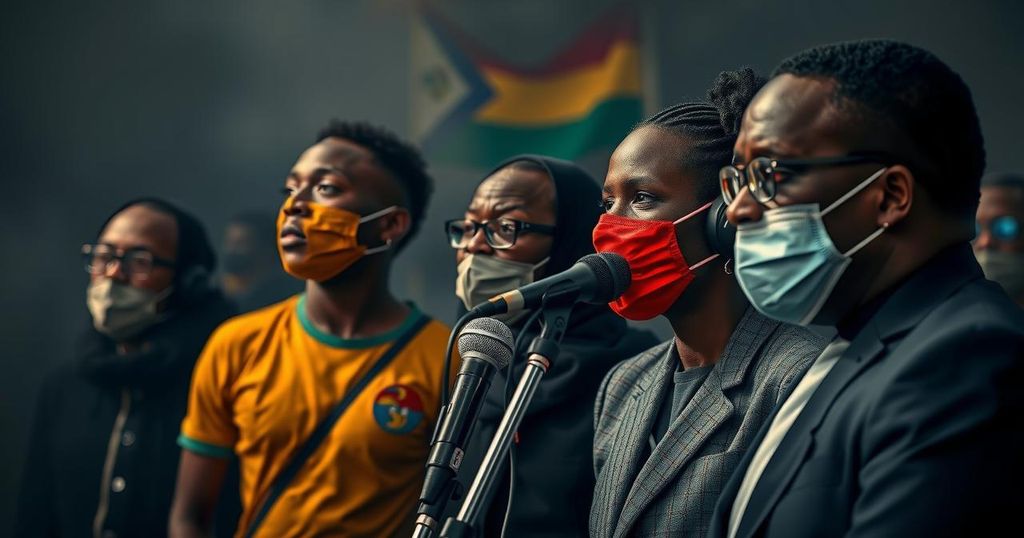Two associates of opposition leader Venancio Mondlane were killed in Maputo, Mozambique, following allegations of electoral fraud after the October 9 elections. The victims, Elvino Dias and Paulo Guambe, were ambushed while in their vehicle. Their deaths have been condemned by various organizations, including the European Union and Portugal’s parliament, emphasizing the need for justice and the protection of democratic processes in Mozambique.
In Maputo, Mozambique’s capital, two associates of Venancio Mondlane, a prominent opposition candidate, were tragically gunned down amid a backdrop of election-related unrest. Following the elections held on October 9, which have been marred by allegations of electoral fraud, the fatalities occurred when Elvino Dias, a lawyer, and Paulo Guambe, a candidate of the Podemos party, were ambushed by gunmen while in their vehicle. Eyewitness accounts indicated that the assailants discharged approximately twenty rounds of ammunition during the assault. Podemos party leader, Albino Forquilha, confirmed the unfortunate demise of both men to the AFP news agency. Although law enforcement has commenced an investigation into the incident, they have yet to officially identify the victims. Reports reveal that a third individual, a woman accompanying Dias and Guambe, sustained injuries and was transported to a medical facility. Leonel Muchina, the police spokesperson, noted that prior to the shooting, the victims had visited a local bar, and they may have been followed due to interactions with other patrons. In response to this violent occurrence, Mr. Mondlane and approximately 100 of his supporters participated in a vigil in Maputo on the evening of the killings, reflecting on the gravity of the situation. As Mozambique awaits the official election results, expected to be released on October 24, the ruling Frelimo party, which has maintained power since the country’s independence in 1975, has proclaimed victory. However, Mondlane has vocally denounced the electoral process as fraudulent, urging citizens to demonstrate on the forthcoming Monday to protest the integrity of the elections. Dias, a vocal critic of the government, had previously expressed concerns regarding threats to his life in the context of the recent elections, adding a layer of urgency to the reactions following these tragic events. The civil society organization, Mais Integridade, condemned the killings as an act of intimidation and a threat to democratic values. The Frelimo party also denounced the act, calling for a thorough investigation into the matter. Furthermore, the European Union and Portugal’s parliament condemned the killings, with the former emphasizing that “In a democracy, there is no place for politically motivated killings.”
The political climate in Mozambique has been tense, particularly following the recent elections held on October 9, 2024, which have been shadowed by allegations of fraud perpetrated by the ruling Frelimo party. This party has dominated the political landscape since Mozambique gained independence from Portugal in 1975. The environment has become increasingly volatile, especially for opposition members who have voiced concerns about their safety amidst what they perceive as a systematic assault on democracy. The events leading to the killings of Elvino Dias and Paulo Guambe not only reflect the immediate dangers faced by political figures in Mozambique but also serve to underscore the broader implications for civil liberties and political discourse in the nation.
The tragic killings of two opposition figures in Mozambique highlight the severe repercussions of political strife in the country, where accusations of electoral misconduct and intimidation are prevalent. As the nation awaits crucial election results amidst widespread unrest, the call for justice for the victims and the safeguarding of democratic principles has gained prominence among both domestic and international observers. The response from various stakeholders, including civil society organizations and foreign governments, illustrates the critical need for accountability and the protection of political freedoms in Mozambique.
Original Source: www.dw.com






